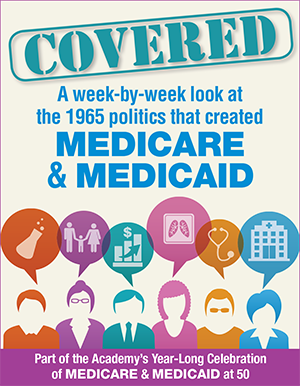Bob Rosenblatt, Special Correspondent
Welcome to Covered: A Week-by-Week Look at the 1965 Politics that Created Medicare and Medicaid. Bob Rosenblatt, a Senior Fellow at the National Academy of Social Insurance, former Los Angeles Times Washington correspondent, and editor of the website HelpWithAging will blog on the maneuvers that led to the enactment of Medicare and Medicaid on July 30th, 1965 the first major expansion of U.S. social insurance to health care.
Johnson Fearful About Medicare Price Tag
March 13, 1965
By Bob Rosenblatt, Special Correspondent
Washington, D.C. – President Johnson is deeply concerned that the cost of the ambitious Medicare health care program could derail its chances in the Senate where conservative Democrats are suspicious about any significant expansion of federal spending.
According to analysts with the Bureau of the Budget, the issue is “fiscal drag”, which is the negative effect major new federal spending could have on job creation and business expansion. Their public estimates about the cost of the new program have enraged the President, according to phone transcripts made available by White House sources. “The fools had to go project it [Medicare] down the road five or six years,” President Johnson said. “The first thing Senator Dick Russell (D-GA) comes running in and says, ‘My God, you’ve got a one billion (dollar) projection for next year on health…Therefore, I’m against any of it now.’”
The big, unexpected numbers were the result of the surprise move by House Ways and Means Committee Chairman Wilbur Mills (D-AR) to combine all three major proposals:
- A Johnson Administration plan for hospital insurance for people over 65 financed through the Social Security System. The plan was called “Medicare,” a label now being applied to the bigger proposal.
- A Republican plan for federal subsidies for private insurance to pay doctor bills.
- An American Medical Association plan adopted by many Republican members of Congress that would expand federal spending to help states pay hospital and doctor bills for poor people.
Passage of this ambitious Medicare proposal seems assured in the House, where last year’s landslide election boosted the ranks of liberal Democrats that support an expansion of government health spending.
Mills, who has long been skeptical about government spending, seems convinced that some legislation is inevitable, and has decided to get out in front of it with his new plan.
He has been in extensive private consultations with the President, who has been using his persuasive skills to keep Mills convinced they are going down the right track. They have been talking since last year about the need to spend more federal dollars on health care. In a series of phone calls, the President reassured Mills that keeping the federal spending down in other areas makes more money available for health care: “You want to put in another 400 million or 500 million [to cover Medicare expansion]? And I say … that 400 million’s not going to separate us friends when it’s for health, when it’s for sickness because there’s a greater demand… for this bill than all my others programs out there.” Unlikely allies, the President and Wilbur Mills have forged an alliance that gives a big boost for the legislative prospects this year for Medicare. We’ll see how it fares in the Senate.
► See the next post in the COVERED series: “House Panel Aims to Help Elderly in Poor Health Leave Mental Hospitals for Nursing Homes,” March 20, 1965
► Learn more about the Academy’s celebration of the 50th anniversary of the enactment of Medicare and Medicaid

